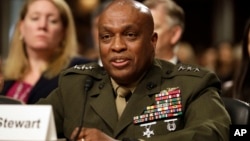The outgoing head of the U.S. Defense Intelligence Agency urged analysts there to “speak truth to power” despite any political pressures they may face.
Marine Lt. Gen. Vincent Stewart made the plea Tuesday at a change of command ceremony at DIA headquarters outside of Washington.
“Speaking with honesty and integrity that which is a highly inconvenient truth is never easy but it has never been more important,” he told the agency’s intelligence analysts.
“Always speak truth to power, no matter the cost,” Stewart said. “There’s no shortage of opinion, informed or otherwise, in government and elsewhere, about how intelligence analysis should be conducted.”
“Unless we are forthright, honest and candid we cannot fulfill our oath,” he said.
Lingering tensions
Stewart's comments come as there has been lingering tensions between the administration of U.S. President Donald Trump and some in the U.S. intelligence community over Russia’s actions during the 2016 presidential election.
In an unclassified report released in January, top U.S. intelligence agencies concluded Russian President Vladimir Putin waged an unprecedented “influence campaign” in an effort to sway the election in favor of then-candidate Trump.
As president, Trump has repeatedly questioned those assessments, suggesting at times it was unclear whether Russia was responsible.
Pushed for greater innovation
But Stewart, who took over at DIA in January 2015, has not been one to shy away from controversy.
He has been an outspoken advocate for the agency, bristling at suggestions from some lawmakers that the DIA has been a “problem child,” though he agreed the agency had been given too many non-essential missions.
“DIA is not failing in its mission,” Stewart told a small group of reporters, including VOA, this past August. “There's not a single combatant commander, and I've had all of them here, who would say DIA is failing.”
Stewart also used his tenure at DIA to push for greater innovation while embracing technological advances to help analysts process an ever-increasing amount of data and information.
Army Lt. Gen, Robert Ashley takes over
Stewart is now set to become deputy commander at U.S. Cyber Command, a move approved by lawmakers this past July.
The new DIA chief, Army Lt. Gen. Robert Ashley, previously served as director of intelligence at both U.S. Central Command and Joint Special Operations Command.
DIA has a workforce of about 16,000 military and civilian employees, half of whom are stationed outside the United States.




